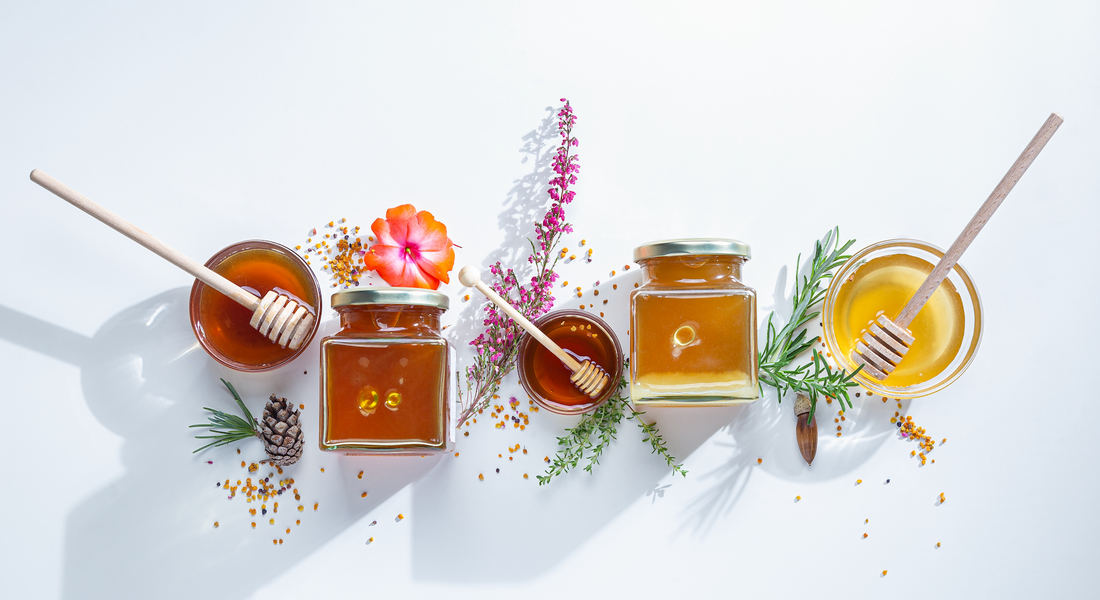Honey has been used for its health benefits for thousands of years. It is a natural sweetener and not only adds flavor to food, but also offers many health benefits. Manuka honey, Ulmo honey, and Rosehip honey have gained popularity in recent years due to their unique properties and health benefits. In this article, we compare the health benefits of these three types of honey and explain why you should consider incorporating them into your diet.
Health Benefits of Honey
Antibacterial and antimicrobial properties : Honey contains hydrogen peroxide, which gives it antibacterial properties, and certain types of honey, such as Manuka honey, contain additional compounds, such as methylglyoxal, which give it strong antibacterial and antimicrobial properties. These properties make honey a natural alternative to antibiotics for treating bacterial infections.
Wound healing : Honey has been used for centuries to heal wounds. Honey promotes wound healing by providing a moist environment, reducing inflammation and preventing infection. The antibacterial properties of honey also help prevent infection in wounds.
Coughs and sore throats : Honey is an effective treatment for coughs and sore throats. Honey coats the throat, soothing the irritation, reducing coughing and easing a sore throat.
Digestive health : Honey has prebiotic properties, promoting the growth of beneficial bacteria in the gut, which may help improve digestive health and reduce the risk of digestive disorders such as inflammatory bowel disease and irritable bowel syndrome.
Anti-inflammatory : Honey contains antioxidants and anti-inflammatory substances that help reduce inflammation throughout the body, which may help reduce your risk of chronic diseases like heart disease, diabetes, and cancer.

Health Benefits of Manuka Honey
Manuka honey is honey made from the flowers of a particular type of Manuka tree native to New Zealand. Manuka honey contains additional compounds not found in other types of honey. These compounds include methylglyoxal, which has strong antibacterial properties. Manuka honey may provide the following health benefits:
Digestive Health: Manuka honey helps to increase beneficial bacteria in the gut, which can improve digestive health.
Wound healing: Manuka honey has strong antibacterial properties that make it effective for wound healing. Manuka honey has also been shown to be effective against antibiotic-resistant bacteria.
Strengthens the immune system: Manuka honey contains antioxidants and anti-inflammatory substances that help strengthen the immune system.
Manuka honey (Wikipedia)
Health Benefits of Ulmo Honey
Ulmo honey is a honey made from the flowers of the South American ulmo tree. Ulmo honey has strong antibacterial properties and is effective in wound healing. Ulmo honey has the following health benefits:
Wound healing: Ulmo honey has been shown to be effective in wound healing. Its antibacterial properties help prevent infection and promote wound healing.
Strengthens the immune system: Ulmo honey contains antioxidants and anti-inflammatory substances that help strengthen the immune system.


Health Benefits of Rose Hip Honey
Rosehip honey is honey produced from rosehips and contains nutrients such as vitamin C. Rosehip honey offers the following health benefits:
Antioxidants: Nutrients such as vitamin C in rosehip honey are powerful antioxidants that help protect cells.
Strengthens the immune system: Rosehip honey contains nutrients such as vitamin C and polyphenols that help strengthen the immune system.
Digestive Health: Rosehip honey promotes digestive health. Rosehips have digestive properties that make them a great combination for supporting the digestive system.
These are the health benefits of Manuka honey, Ulmo honey, and Rosehip honey. Each type of honey contains different nutrients, so it's important to choose the one that best suits your health goals. However, all honeys offer health benefits, such as strong antibacterial properties and strengthening the immune system, so it's recommended to consume them on a daily basis.
A comparative study of Ulmo honey and Manuka honey (English only)





